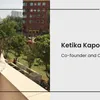Startup Guide Egypt: Regional insights and founder tips for innovators and social entrepreneurs
This new book covers emerging startups, accelerators, investors, and support institutes in three regions of Egypt. Here are key founder and enabler insights.
Launched in 2012, YourStory's Book Review section features over 320 titles on creativity, innovation, entrepreneurship, and digital transformation. See also our related columns The Turning Point, Techie Tuesdays, and Storybites.
The Startup Guide series of books, launched in 2014 by Copenhagen-based publisher Sissel Hansen, covers over 40 cities around the world. See our reviews of the guidebooks for New York, Berlin, Zurich, Paris, Barcelona, Stockholm, Johannesburg, Nairobi, Tokyo, Bangkok, and Singapore.
The publisher has also launched a new series focussed on entire countries such as Startup Guide Egypt. It is based on a systematic analysis of the startup’s needs, and also highlights the social impact and purpose-driven initiatives.
With extensive support from local partners, the material in Startup Guide Egypt is spread across 170 pages and makes for an informative and inspiring read. There are in-depth profiles of founders, co-working spaces, incubators, and other ecosystem players (see highlights in the table below). The material is insightful, superbly illustrated, and well-designed.

“Egypt may bring to mind ancient culture and arid landscapes, but its startup scene is young and blooming,” Sissel Hansen begins. In addition to Cairo, cities like Alexandria, Assiut, and other communities have strong startup ecosystems.
The pandemic has driven entrepreneurs to persist and embrace new types of innovation. This includes social impact and environmental responsibility.
The analysis is based on five dimensions from the Impact Management Project: outcomes, communities, scale, contribution, and risk. Other criteria for startup selection include purpose, profits and value (anchored in the UN SDGs).
Overview
As the bridge between Africa and the Middle East, Egypt is an attractive market for startups and investors, despite recent social-political turbulence.
The book cites research which shows that in 2019, Egyptian startups sealed 142 deals worth $95 million, accounting for the largest number of deals in the MENA region. Nearly two-thirds of these deals were closed by foreign investors.
National initiatives for the promotion of entrepreneurship include the Technology Innovation and Entrepreneurship Center (TIEC) and Egypt Ventures. The Go Green Initiative is part of the National Sustainable Development Strategy ‘Egypt 2030.’

The material covers the startup ecosystem in three sections. The Delta and Lower Egypt (metropolitan population of 47 million) include the cities of Alexandria, Port Said, and Mansoura. Upper Egypt (30 million) has Sohag, Assiut, and Luxor.
Cairo (20 million) is the dominant cultural, political, and economic hub. See my book review of Startup Guide Cairo.
For each region, the book assesses its Startup Friendliness Index developed by Enpact DataLab. It covers parameters such as the prevalence of accelerators, coworking spaces, and success stories of startups. Support rankings are provided for various steps of the startup journey, from idea and launch to market expansion and funding.
Beyond city hubs, there are regional initiatives such as Injaz Egypt, which has two incubator programmes that have spawned 70 companies. NilePreneurs, implemented by Nile University, has incubated over 100 startups.
NP Incubate supports hardware and software startups. TIEC has supported over 5,000 entrepreneurs, and its Heya Raeda pre-incubation programme empowers female entrepreneurs.

The need for startups and impact
“Entrepreneurship has been rooted in Egyptian DNA for thousands of years,” says Mohamed Helmy, CEO of Egypt’s first co-working space District Spaces.
“While Egypt remains a challenging environment for startups, it is also an amazing laboratory to experiment and test new ideas,” observes Alban de Ménonville, Co-founder of social enterprise Bassita.
“With the unprecedented impact of COVID-19, there is a need for entrepreneurs to deliver innovative solutions to the challenges of the new normal,” explains professor Ayman Ismail, Founding Director, AUC Venture Lab.
Youth represent over 35 percent of the country’s 100 million population, according to Wessam El Beih, Egypt Director for Zurich-headquartered Drosos Foundation. “We need to expand beyond the big cities and create opportunities for youth in remote locations,” he adds.
It is important to have an accessible and resourceful ecosystem to transfer know-how across the country’s social innovators, emphasises Iman Bibars, Founder and Managing Director of social entrepreneurship school IbtikarKhana.
“There is growing global interest in impact investment and increasing government initiatives to support startups and SMEs,” observes Rawan Bassam, Managing Director of Enpact Egypt, which supports Startup Haus Cairo along with the Drosos Foundation.

I. Cairo
Cairo ranks 28th in the global Startup Friendliness Index (SFI) and is the third-most populous city in Africa and the sixth-most populous in the world. It is home to a large number of expatriates as well.
Much of the startup funding last year went to startups in the fintech, telehealth and ecommerce sectors. Fawry was the country’s first fintech unicorn in 2019, while matchmaking app Harmonica was acquired by US-based Match Group.
Startup profiles
Social enterprise Bassita has provided crowd support for initiatives through click funding. Twelve campaigns have already benefited, including VeryNile; it raises awareness of the importance of environmental protection, and has collected tons of trash from the Nile.
Design-based firm Doodle Factory helps children leverage their creativity and sell products to solve their problems. Examples include fundraising for a cochlear implant operation.

Four Biscuits bakery helps those with Down syndrome find more business opportunities. Shezlong is an online mental health platform that connects 70,000 customers to over 450 therapists from 75 counties.
Healthtech startup VRapeutic develops VR experiences for children with dyslexia, autism and cerebral palsy. It ultimately helps them acquire cognitive, motor and social skills.
Aya Abdelraouf and Mounaz Abdelraouf are co-founders of luxury fashion brand Okhtein (‘sisters’ in Arabic). Its handbags, belts and sunglasses are available in nine countries.
The book is packed with inspiring founder interviews, and insights from entrepreneurship support organisations. Each story includes key takeaways and messages for the next wave of entrepreneurs.
“Entrepreneurship is all about solving problems, identifying these specific problems and having enough self-awareness that you’re ready to start a business,” explains Yaseen Abdel-Ghaffar, Founder of SolarizEgypt, a solar engineering, procurement and construction company.
He advises founders to leverage their strength of speed, and be generous with their team. Founders should also be open to having a more seasoned CEO come in and run the company as it scales.

“Don’t let challenges and failures get to you – you’re going to be a student until you are one hundred years old,” suggests Sarah El Battouty, Founder of environmental consultancy ECOnsult. It helps companies pursue their green business goals.
Sarah urges founders to have patience and relay their passion to their team. She also founded another startup called MuBun, which specialises in making furniture out of scrap waste.
“Egypt has a young population with demographics that cater to the flourishing of startups and a green economy,” Sarah observes.
“Hope and aspiration only happen through arts and culture,” explains Ahmed El Attar, Founder of Orient Productions. It provides training and residency space for artists, and hosts the D-CAF arts festival.
The founders also provide their assessments of Cairo as a startup hub. “Cairo is a buzzing city. It’s also completely chaotic. It’s both a pleasure and a burden to live in,” Ahmed describes.
Yaseen notices a shift over the past decade in Egypt where entrepreneurship is seen as a calling for successful performers and professionals. “Before that, startups were viewed as something that you did if you couldn’t find the perfect job,” he recalls.

Ecosystem
Cairo has several entrepreneurship support programmes. For example, Social entrepreneurship school IbtikarKhana has supported startups like Naqaa, EduCup, and PinKy.
AUC Venture Lab (also known as V-Lab) was launched in 2013 as the first university-based accelerator in Egypt. It has supported more than 200 startups, including notable ones such as Swvl, DentaCarts, Rology, GBArena, XPay, and Bosta. It also offers a 16-week fintech programme.
Endeavor’s Egypt centre was founded in 2008, and has supported 55 entrepreneurs across various sectors from startups such as Instabug, Vezeeta, Imtenan, Dsquares, and Gourmet.
Endeavor Egypt's portfolio includes Almouneer, the first diabetic retinal-care centre in Egypt, and solar energy firm SolarizEgypt.
Falak Startups has accelerated over 60 startups, such as 3elagi, PayNas, Raseedi, Mayday, Teradix, and Rabbit. Regional accelerator Flat6Labs has invested in 106 startups and trained more than 800 founders of startups such as Hawaya, Instabug, Chefaa, Argineering, Brimore, and Moneyfellows.
Co-founded by Cairo Angels, MINT Incubator runs an intensive three-to-four-month programme, and has 64 supported startups like Vetwork, Elgameya, Oddigo, Cyber Talents, and Mayday. The NGO Nahdet El Mahrousa provides incubation and also runs the Garage El Mahrousa co-working space.
Co-working facilities in Cairo are provided by District Spaces (the first in Egypt), The GrEEK Campus (birthplace of RiseUp Summit), Startup Haus Cairo, and MQR.
As for academic support, Ain Shams University runs the iHub programme for youth entrepreneurship. The American University in Cairo, British University in Egypt, National Academy for Science and Skills (NASS), Nile University, and University of Science and Technology in Zewail City also provided entrepreneurship education and support.

Investors
Cairo’s funding support for founders includes Algebra Ventures. It has funded fintech Khazna, ride-hailing app Halan, and social commerce platform Brimore.
Investment fund A15 is managed by Accelero Capital, whose founder Karim Beshara also started Egypt’s first ISP in 1996. It has funded TPAY (direct-billing program, sold to Helios Partners), fintech PayMob, and shopper engagement platform Intouch.
Cairo Angels is the first and most active angel network in Egypt, with a network of over 80 angels.
EdVentures, part of the Nahdet Misr Publishing Group, has provided startup funding and incubation support in the education and culture sectors. During the pandemic, it invested in content simplification startup Akhdar.
HIMangel help startups in sectors that do not usually attract traditional VCs. “When you reach a certain level of success, you feel like it’s time to give back,” explains founder Khaled Ismail.
It has supported online psychiatric services booking platform Shezlong, and FilKhedma, an app for booking home maintenance services.
The investors provide a range of tips for aspiring founders on the importance of drive, team alignment, execution skills, monetisable products, and willingness to pivot. Founders should be coachable as well, and have a solid understanding of customers and markets.

II. Delta and Lower Egypt
The region where a branch of the Nile meets the Mediterranean Sea is home to the cities of Alexandria (second-largest startup ecosystem) and Mansoura (third-largest).
Many startups here are focused on agriculture and the environment. There’s an “unspoken rivalry between the people of the Delta region and those of Cairo,” the authors observe. The region is host to the Techne Summit and Alex Angels.
Startup profiles
Notable startups from this region include ElRoshetta (e-pharmacy), iDF3 (cashless payment), Lynks (ecommerce), and Werpx (AI-enabled logistics).
The Aldoctor app delivers on-demand medical services to the patient’s doorstep. Social enterprise Banlastic Egypt aims to ban the use of single-use plastic via green alternatives as well as services like beach clean-ups and awareness workshops.
Black Duck makes bags and other products out of recycled plastics. Vermi Dutch recycles organic waste and produces fertilisers with the help of earthworms.
“Make sure that everyone on the founding team has their own unique input and journey when building your startup,” advises Mohamed Khashaba, Founder and CEO, TakeStep. The tech-based platform connects psychiatrists with patients, and tries to tackle social stigmas around mental health.

Ecosystem
Tarek El-Kady, Founder and CEO, Techne, runs events and connection platforms for startup ecosystems operating along the coast of the Mediterranean Sea. This includes annual summits in Alexandria and Dubrovnik (Croatia).
The Ebni incubator supports IoT-enabling startups such as VoxEra, Mogassam, Conative Labs, Smartly Fit, and Trackky. The icealex Innovation Hub has supported startups such as Hood, Brandloca, and MaterialSolved.
Startup Reactor by Cultiv runs programmes at different stages called Ignition and Startup Reactor. It has supported startups like Tripdizer, Agrona, IN3D, Thotron, Konslto, Takol, and El Mohandes.
Co-working spaces in these cities include Al Makkan, Flux Coworking Space, and M3mal. Education and research support for startups is provided by the Arab Academy for Science, Technology & Maritime Transport. It runs an Entrepreneurship Centre, The Entrepreneurship Student Society, and the Yalla Startup Programme.
Alex Angels is the second-largest angel investor network in Egypt, while Med Angels syndicates investments across 21 Mediterranean countries. The Alexandria Business Association runs the SME Project, which includes microfinancing support.

III. Upper Egypt
Upper Egypt is the site of many of Egypt’s ancient landmarks, and is a major tourism hub. Many startups here focus on intercity rideshare, agriculture, eco-tourism, and traditional crafts of the indigenous Nubian people.
The population is predominantly rural, and the region’s costs of living are more affordable. The city of Assiut has a high proportion of university students, and is an emerging hub for startups.
“Being a part of the startup ecosystem in Upper Egypt is a great and exciting journey,” affirms Alaa Fahmy, CEO, Enroot.
Notable startups here include Baramoda (sustainable agriculture, waste recycling), Egypt Tour Guide (travel app), El7akni (natal care platform), and Presto (same-day delivery services).
Turath connects artisan communities to potential buyers internationally. Motiva supports the craftswomen in the city of Sohag, the birthplace of crafts like tally (bending gold and silver to make jewellery) and mansaj (weaving using small looms).

“Partners will keep you on track,” Ahmed Yehia, CEO and Managing Director of ECO Nubia, advises aspiring entrepreneurs. “Partners will keep you down to earth,” he adds.
Ahmed initially worked in the IT and telco industries before founding his ecolodge. He also runs ECO Adventures and ECO Events.
May Gah Allah, Founder and MD of the Konouz Nubia Foundation, empowers the Nubian community with skills training and heritage projects. She also founded MG Kindakka International, which makes Nubian crafts and exports them to the West.
“You have the right to fail. It is healthy to fail, but don’t stop. Learn from your mistakes,” she advises aspiring founders. May invests in people who are willing to learn even if they make mistakes, and treats them as beneficiaries of her startup.
“If you have an idea that you believe in, that you believe can make a positive impact, then just get started,” urges Usama Ghazali, Cofounder of artisan platform Yadaweya, which connects over 4,500 artisans.

Ecosystem
Upper Egypt programmes include Athar incubator, which runs two cohorts of up to 25 startups each and has supported startups like Muhtawa, Vetution, and Appcubes.
The Egypt Foundation for Integrated Development (El Nidaa) has trained over 1,800 women and youth. It supports MSME cluster creation as well.
Enroot supports development partners for inclusive impact. It has assisted founders of startups like Flex and Electronic Rec.
Co-working spaces here include Cloud Coworking, Fekra Cultural Center, and HOUSE. Entrepreneurship education is provided by Assiut University, Aswan University, Sohag University (home to Massar Incubator).
Technische Universität Berlin Campus El Gouna has also hosted investment conferences and the first Egyptian Entrepreneurship Summit. Beyond the cities, entrepreneur support is provided by Ideaspace, Mok3b, and Habiba Community.

The book ends with a directory of startup resources in Egypt, as well as a list of useful conferences and events for founders. These include Vested Summit, Cairo ICT, Cairo Innovates, E-Commerce Summit, EduVation Summit, Entreprenelle, Riseup Summit, Seamless, and Techne Drifts.
In sum, the book provides inspiring and practical insights into Egypt’s startup ecosystem, as well as a useful framework for other cities and countries to reflect on and improve their own startup ecosystems.
YourStory has also published the pocketbook ‘Proverbs and Quotes for Entrepreneurs: A World of Inspiration for Startups’ as a creative and motivational guide for innovators (downloadable as apps here: Apple, Android).
Edited by Megha Reddy




![[Year in Review 2021] Top 10 blockchain startup stories to look back upon](https://images.yourstory.com/cs/2/98e25df018b511e988ceff9061f4e5e7/blockchain-story-1639294935566.png?fm=png&auto=format&h=100&w=100&crop=entropy&fit=crop)
![[Product Roadmap] How DeHaat has helped 650,000 farmers across India increase crop yield with technology](https://images.yourstory.com/cs/2/a9efa9c02dd911e9adc52d913c55075e/Productroadmap-76-1638878040638.png?fm=png&auto=format&h=100&w=100&crop=entropy&fit=crop)


![[Monday Motivation] This engineering student is rehabilitating and rehoming animals since the age of 13](https://images.yourstory.com/cs/5/79900dd0d91311e8a16045a90309d734/zabi-1639328300122.jpg?fm=png&auto=format&h=100&w=100&crop=entropy&fit=crop)





